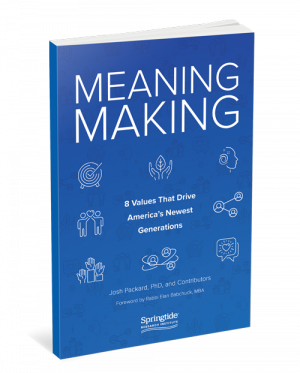
Meaning Making: Music as the Means to Connection
Below is an excerpt from Meaning Making: 8 Values That Drive America’s Newest Generations. Follow along on the blog for more excerpts, check out the additional resources on our Meaning Making page, and buy the book here.
Together with collaborator Rev. Sue Phillips, Angie Thurston and Casper ter Kuile produced the How We Gather report while students at Harvard Divinity School. This report highlighted an emerging trend among millennials and young adults: a trend toward community and meaning making, which was an especially surprising finding against the backdrop of steady religious disaffiliation for the past decade.
They discovered and studied nontraditional spaces answering this call: workout gyms providing personal accountability, arts movements promoting social and personal transformation, grown-up summer camps as creative communities imbued with ritual and retreat. This report notes six recurring themes in the organizations they studied: community, personal transformation, social transformation, purpose finding, creativity, and accountability.
In the introduction to their report, the authors describe the way young people are forging something new. Despite checking the “none” box on quantitative surveys when it comes to religious practices, young people are seeking meaning. In fact,
when they say they are not looking for a faith community, [they] might mean they are not interested in belonging to an institution with religious creed as the threshold. However, they are decidedly looking for spirituality and community in combination, and feel they can’t lead a meaningful life without it.
Ter Kuile, writing in Pacific Standard in 2019, breaks these categories and spaces down even further. He notes a statistic reported in June 2018 by Vice: “Eighty percent of these young people have a sense of spirituality, believing in some cosmic power, while seven in 10 are looking for spirituality but think organized religion is not relevant.” And then he asks the all-important question: How are young people finding meaning? How are they “caring for their souls?”
At this point, ter Kuile observes a fluid pattern that can and does pervade many different types of organizations and social gatherings: the way music can connect people and give meaning. “The most common ‘spiritual technology’ for connection is music,” he writes, noting that traditional institutions for meaning making and meaning giving, like organized religion, haven’t met young people’s expectations.
Drawing on a story from his own experience, he recalls a time when undergraduates in a dormitory he oversaw created a space after a student died by suicide. “His friends wanted to process their emotions together. . . . They suggested bringing a guitar, and hosted a gathering of grieving—telling stories and singing together.”
Something about music transcends traditional boundaries: music has form and structure, but it also has emotion and flexibility—meaning can be interpreted differently by each person, and even by the same person at different points in their life. Though music may not be the cause for gathering at your own organization, the principle this illustrates can apply broadly.
Young people are seeking meaningful experiences wherever they go. If one is not provided—as in the case of students grieving in the space of their dorms—they will create it. Music is one of the tools anyone can use to make space for meaning, but there are others: technology, poetry, ritual, and more. Many of the examples and tips provided in this book are ways to bring meaning-making practices to spaces not always associated with that task. Maybe music can be incorporated into some practices at your organization. Alternatively, maybe you can use onboarding as a way of creating a sense of belonging and welcoming. Perhaps you can use social media as a medium for cultivating authentic relationships. Maybe your group can hold space for raising environmental consciousness: these are all ways of bringing meaning-making practices into your organization.
Act on the Data: Sixty-five percent of young people say it is important that organizations they participate in provide opportunities for them to clarify, articulate, and act on one’s personal mission in life. Music has a particular kind of power for creating meaning and connecting communities. Can you imagine ways your organization might harness the power of music to help young people clarify their sense of purpose?




